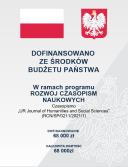Historic bells in north and western Poland. Research questions in the context of the loss of cultural goods
DOI:
https://doi.org/10.15584/johass.2019.2.4Keywords:
Antique bells, losses of cultural goods, Western and Northern Poland, Polish-German relationsAbstract
The article, which is a case study, is based on documents from the Deutsches Glockenarchiv resource in Nuremberg and from the District Liquidation Office in Wrocław. By analyzing the process of requisitioning and then recovering selected documents, the problems of disposing (and dispersing) the bells after the War in Poland were shown. The activities of ARG and the activities of Polish institutions after 1945 are clearly linked in the liquidation of losses and the recovery of bells. Full understanding of the discussed phenomena is, in the author's opinion, extremely important in understanding methodological problems when examining bells loss, but it may also refer to the issues of other cultural goods whose fate after the Second World War are still the subject of research. In the case of bells, the methodological context of defining losses, which were not always warlike, is significant, but is the result of the situation of post-war cultural goods – especially in the case of so-called Regained Territories. These materials form the background of the displacement (and requisition in the context of the transfer to the smelters) of bells in the 1950s in Western and Northern Poland.
Downloads
Downloads
Published
How to Cite
Issue
Section
License
Copyright (c) 2019 Wydawnictwo Uniwersytetu Rzeszowskiego

This work is licensed under a Creative Commons Attribution-NonCommercial 4.0 International License.



